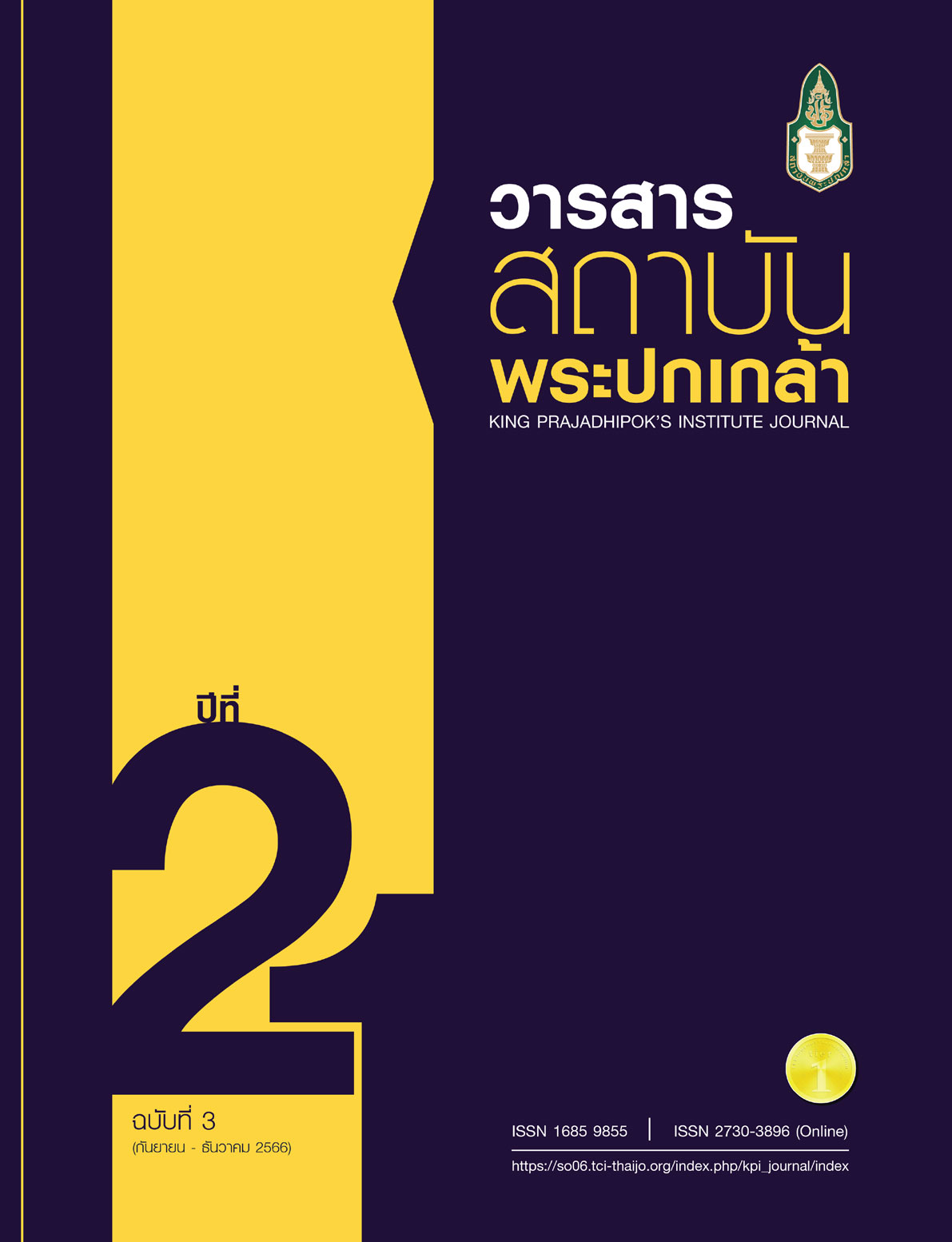They Said We Were Brain Washed: How Thai Students Learn Democratic Values Under the Limited Socialization of Democratic Values. The Case Study of the Thai Student Mob in 2020
Main Article Content
Abstract
This article aims to understand the conditions that drive high school students in Thailand to protest the government in 2020, even though they are socialized with limited democracy under the Thai educational system. It uses qualitative research methods through documentary research and in-depth interviews with 70 high school students and 31 social-study teachers who were sampled from 24 schools that were involved in the political movement in 2020. This article uses content analysis along with discourse analysis and uses structuration theory to explain the findings. The study found that students can understand democratic values despite not being in a democratic environment under political socialization, which has limitations in dominating the thoughts and behaviour of the students. Meanwhile, students can consider and judge what to do under the limited socio-political structure. However, students cannot understand democratic values by evolution, instead by incidents that attack their former thoughts, which later leads to self-study of democratic values. The study found that democratic values learning would occur when three conditions come together: 1) changing of external structure, 2) enlightening of thought, and 3) an explanation that relates between the current situation and value of what the students hold in a way that could benefit them. However, the political values of the student can go back and forth like a cycle between enlightenment and compliance as the result of double learning due to the clash of ideas and practices of individuals under constraints of the structure.
Article Details

This work is licensed under a Creative Commons Attribution-NonCommercial-NoDerivatives 4.0 International License.
@ 2020 King Prajadhipok's Institute The Government Complex Commemorating All Right Reserved.
References
ภาษาไทย
กระทรวงศึกษาธิการ. (2551). หลักสูตรแกนกลางการศึกษาขั้นพื้นฐาน พ.ศ. 2551. กรุงเทพฯ:
โรงพิมพ์ชุมนุมสหกรณ์การเกษตรแห่งประเทศไทย.
กระทรวงศึกษาธิการ, สำนักวิชาการและมาตรฐานการศึกษา. (2557). แนวทางการจัดการเรียนรู้
รายวิชาเพิ่มเติมหน้าที่พลเมือง. เอกสารประกอบการอบรมวิทยากรแกนนำในการพัฒนาการ
จัดการเรียนการสอนประวัติศาสตร์และหน้ที่พลเมือง. สืบค้นจากhttps://www.sl.ac.th/files/civics.pdf
กระมล ทองธรรมชาติ, ดำรงค์ ฐานดี และดำรง ธรรมารักษ์. (2558). หน้าที่พลเมือง วัฒนธรรม และการดำเนินชีวิตในสังคม ม.4-6. กรุงเทพฯ: อักษรเจริญทัศน์.
กาฟ. นักเรียน. โรงเรียนแห่งหนึ่งที่ออกมาเคลื่อนไหวทางการเมืองในปี 2563. (2564, 15 กรกฎาคม). สัมภาษณ์.
คิวพี. นักเรียน. โรงเรียนแห่งหนึ่งที่ออกมาเคลื่อนไหวทางการเมืองในปี 2563. (2564, 28 กรกฎาคม). สัมภาษณ์.
ครูกบ. ครูผู้สอนรายวิชาสังคมศึกษา โรงเรียนแห่งหนึ่งที่มีนักเรียนออกมาเคลื่อนไหวทางการเมืองในปี 2563. (2565, 10 มิถุนายน). สัมภาษณ์.
ครูเขียว. ครูผู้สอนรายวิชาสังคมศึกษา โรงเรียนแห่งหนึ่งที่มีนักเรียนออกมาเคลื่อนไหวทางการเมืองในปี 2563. (2565, 10 กรกฎาคม). สัมภาษณ์.
ครูจี้ด. ครูผู้สอนรายวิชาสังคมศึกษา โรงเรียนแห่งหนึ่งที่มีนักเรียนออกมาเคลื่อนไหวทางการเมืองในปี 2563. (2565, 21 กรกฎาคม). สัมภาษณ์.
ครูนัด. ครูผู้สอนรายวิชาสังคมศึกษา โรงเรียนแห่งหนึ่งที่มีนักเรียนออกมาเคลื่อนไหวทางการเมืองในปี 2563. (2565, 30 มิถุนายน). สัมภาษณ์.
ครูนิด. ครูผู้สอนรายวิชาสังคมศึกษา โรงเรียนแห่งหนึ่งที่มีนักเรียนออกมาเคลื่อนไหวทางการเมืองในปี 2563. (2565, 30 มิถุนายน). สัมภาษณ์.
ครูน้ำ. ครูผู้สอนรายวิชาสังคมศึกษา โรงเรียนแห่งหนึ่งที่มีนักเรียนออกมาเคลื่อนไหวทางการเมืองในปี 2563. (2565, 19 กรกฎาคม). สัมภาษณ์.
ครูสอง. ครูผู้สอนรายวิชาสังคมศึกษา โรงเรียนแห่งหนึ่งที่มีนักเรียนออกมาเคลื่อนไหวทางการเมืองในปี 2563. (2565, 4 กรกฎาคม). สัมภาษณ์.
ครูสาม. ครูผู้สอนรายวิชาสังคมศึกษา โรงเรียนแห่งหนึ่งที่มีนักเรียนออกมาเคลื่อนไหวทางการเมืองในปี 2563. (2565, 5 กรกฎาคม). สัมภาษณ์.
ธวัช ทันโตภาส และคณะ. (2558). หน้าที่พลเมือง วัฒนธรรม และการดำเนินชีวิตในสังคม ม.4-6.
กรุงเทพฯ: วัฒนาพานิช.
นฤมล นิ่มนวล. (2559). การเมืองในแบบเรียนชั้นมัธยมศึกษาของไทยระหว่างปี พ.ศ. 2503-2551.
(วิทยานิพนธ์รัฐศาสตรมหาบัณฑิต) มหาวิทยาลัยธรรมศาสตร์, คณะรัฐศาสตร์, สาขาการปกครอง. กรุงเทพฯ.
เนชั่นออนไลน์. (2563). หมอวรงค์ "ชี้" ลัทธิชังชาติ"กำลังปลุกปั่นเด็กรุ่นใหม่. สืบค้นจาก https://www.youtube.com/watch?v=3d2a_Q7PdAc
เนติวิทย์ โชติภัทร์ไพศาล. นิสิตคณะรัฐศาสตร์ จุฬาลงกรณ์มหาวิทยาลัย. (2565, 11 กุมภาพันธ์). สัมภาษณ์.
บีบีซี ไทย. (2563). นักศึกษาประท้วง: คนรุ่นใหม่เผยเหตุผลที่ออกมาชุมนุมต่อต้านรัฐบาลประยุทธ์.
สืบค้นจาก https://www.bbc.com/thai/thailand-51716774
ประชาไท. (2563). นักเรียนเตรียมอุดมฯ ชุมนุมต้านเผด็จการแถลงสิทธิพลเมืองเป็นของทุกคน. สืบค้นจาก https://prachatai.com/journal/2020/02/86540
ผู้จัดการออนไลน์. (2564). “ลัทธิสามกีบ” ชังชาติอันเลวร้ายของผู้พ่ายแพ้เสมอในชีวิตจริง.
สืบค้นจาก https://mgronline.com/daily/detail/9640000126506
พก. นักเรียน โรงเรียนแห่งหนึ่งที่ออกมาเคลื่อนไหวทางการเมืองในปี 2563. (2565, 5 กุมภาพันธ์). สัมภาษณ์.
มติชนสุดสัปดาห์. (2562). คนรุ่นใหม่หันมาแสดงออกการเมืองก็เพราะพฤติกรรมรัฐบาลเองล้วนๆ! จะมีโอกาสลงถนนหรือไม่ปัจจัยใดส่งผล. สืบค้นจาก https://www.youtube.com/watch?v=kMyustDFW34
มะปราง. นักเรียน โรงเรียนแห่งหนึ่งที่ออกมาเคลื่อนไหวทางการเมืองในปี 2563. (2564, 11 กรกฎาคม). สัมภาษณ์.
เม. นักเรียน โรงเรียนแห่งหนึ่งที่ออกมาเคลื่อนไหวทางการเมืองในปี 2563. (2564, 10 กรกฎาคม). สัมภาษณ์.
ยุรารัตน์ พันธุ์ยุรา และคณะ. (2558). หน้าที่พลเมืองวัฒนธรรมและการดำเนินชีวิตในสังคม ม.4-6.
กรุงเทพฯ: เอมพันธ์.
ลิขิต ธีรเวคิน. (2529). วัฒนธรรมทางการเมืองและการเรียนรู้กล่อมเกลาทางการเมือง (เอกสารทางวิชาการหมายเลข 28). กรุงเทพฯ: ศูนย์วิจัยคณะรัฐศาสตร์ มหาวิทยาลัยธรรมศาสตร์.
วัชรพล พุทธรักษา. (2541). แนวความคิดการครองอำนาจนำของกรัมชี่: บททดลองเสนอใน
การอธิบายปรากฏการณ์ทางการเมืองไทย. สืบค้นจาก https://www.academia.edu/518933/2007_แนวความคิดการครองอํานาจนําของกรัมชี_บททดลองเสนอในการอธิบายปรากฏการณ_ทางการเมืองไทย_in_Thai_
สถาบันพระปกเกล้า. (2565) ความรู้เบื้องต้นการปกครองในระบอบประชาธิปไตยอันมีพระมหากษัตริย์ทรงเป็นประมุข. (พิมพ์ครั้งที่ 3). กรุงเทพฯ: สถาบันพระปกเกล้า.
อนุสรณ์ ลิ่มมณี. (2542). การอธิบายกับการวิเคราะห์ทางการเมือง : ข้อพิจารณาเบื้องต้นในเชิง
ปรัชญาสังคมศาสตร์. กรุงเทพฯ: โครงการผลิตตำราและเอกสารการสอน คณะรัฐศาสตร์
จุฬาลงกรณ์มหาวิทยาลัย.
ภาษาอังกฤษ
Almond G. A. & Verba S. (1963). The Civic Culture: Political Attitudes and Democracy in Five Nations. Boston : Little & Brown.
Amna E., Ekstrom M., Kerr M. & Stattin H. (2009). Political Socialization and Human Agency: The Development of Civic Engagement from Adolescence to Adulthood. Statsvetenskaplig Tidskrift, 111(1), 27-40.
Beck, P.A., & Jennings, M.K. (1982). Pathways to Participation. American Political Science Review, 76(1), 94-108.
Castells M. (1998). The Rise of the Network Society. Malden, Mass.: Blackwell Publishers.
Dawson R. E. & Prewitt K. (1969). Political Socialization. USA: Little, Brown and Company.
Dinas, E. (2014). Why does the Apple Fall Far from the Tree? How Early Political
Socialization Prompts Parent-child Dissimilarity. British Journal of Political
Science, 44(4), 827-852.
Easton D. (1957). An Approach to the Analysis of Political Systems. World Politics, 9(3), 383-400.
Easton, D. (1965). A System Analysis of Political Life. New York: John Wiley & Sons.
Ernesto L. & Chantal M. (2001). Hegemony and Socialist Strategy: Towards a Radical
Democratic Politics. (2nd edition). London: Verso.
Faubion J. D. (1994). Power: Essential Works of Foucault 1954-1984 Vol.3. London: Penguin Books.
Giddens, A. (1984). The Constitution of Society: Outline of the Theory of Structuration. Cambridge: Polity Press.
Hong, Y. & Lin, T. (2017). The Impacts of Political Socialization on People’s Online and Offline Political Participation—Taking the Youth of Singapore as an Example. Advances in Journalism and Communication, 5, 50-70.
Institute of Security and International Studies (ISIS) Thailand. (2020). Thailand’s Youth Movement and Political Directions In Search of A Common Future Wednesday, 26th August 2020. Retrieved from https://www.facebook.com/ISISThailand/videos/747334535832336/?extid
=jHO3Mh4XyWFquzC0
Jennings, M. K., Stoker, L., & Bowers, J. (2009). Politics Across Generations: Family Transmission Reexamined. The Journal of Politics, 71(3): p.782–799
McNair, Brian. (2011). An Introduction to Political Communication. (5th edition). London: Routledge.
Neundorf A., Niemi R., Smets K. (2016). The Compensation Effect of Civic Education on Political Engagement: How Civics Classes Make Up for Missing Parental
Socialization. Political Behavior, 38, 921-949.
Richard E. Dawson & Kenneth Prewitt. (1969). Political Socialization. USA: Little, Brown and Company.
Steven L. (1974). Power a Radical View. London: Macmillan press.
Stones R. & Tangsupvattana A. (2012). Social Theory, Current Affairs, and Thailand’s
Political Turmoil: Seeing Beyond Reds vs. Yellow. Journal of Political Power,
(2), 217-238.
Thinapan Nakata. (1977). Thai Political Culture and Socialization. In Thai Political Culture and Socialization, from the Review of Thai Social Science : A Collection of Articles by Thai Scholars (pp.1-29). Bangkok: The Social Science Association of Thailand.
Westholm, A. (1999). The Perceptual Pathway: Tracing the Mechanisms of Political
Value Transfer across Generations. Political Psychology, 20(3), 525-551.
Wolak J. (2009). Explaining Change in Party Identification in Adolescence. Electoral Studies, 28(4), 573-583.


